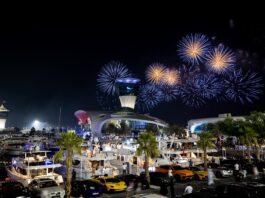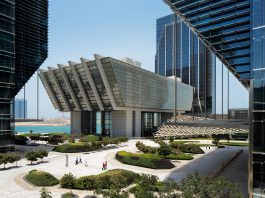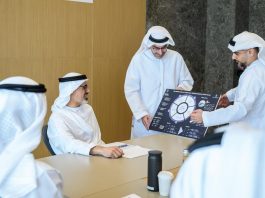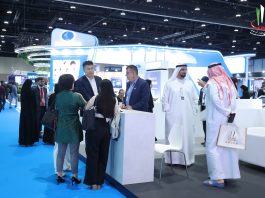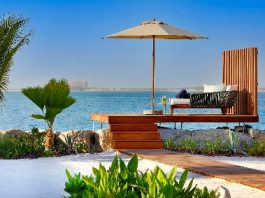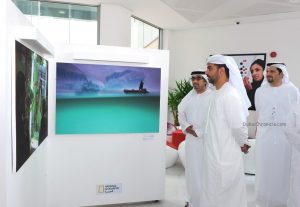 For the first time since its founding in 1888, The National Geographic, and jointly by Total Abu Al Bukhoosh and the Total Foundation, have recently released a new special book about the natural and wild life in Abu Dhabi, capital of the United Arab Emirates.
For the first time since its founding in 1888, The National Geographic, and jointly by Total Abu Al Bukhoosh and the Total Foundation, have recently released a new special book about the natural and wild life in Abu Dhabi, capital of the United Arab Emirates.
With tremendous support from the Environment Agency – Abu Dhabi, The Arabic version book, “Abu Dhabi, Nature Preserved”, is a work of vital importance. It blends the scientific information of the invaluable biodiversity of the United Arab Emirates along with the enriched Arab lifestyle, culture and traditions.
H.H. Sheikh Hamdan bin Zayed Al Nahyan, Chairman of the Environment Agency – Abu Dhabi, said that the authority has been applying all efforts and methods to maintain all forms of life on the United Arab Emirates land, air and seas. He pointed out the existence of many animals such as wild deer, bustards, falcons, dolphins and dugongs, for thousands of years.” “Abu Dhabi falls into that select category of places where the vast expanses of sand caress the gentle strokes of the sea waves. The Bedouins of this emirate had mastered the art and science of not only surviving but also thriving in this apparently uninhabitable environment; extremely harsh weather conditions of the desert prevented people from the outside world to interfere with this land and sea. A few millennia ago, venturous individuals did traverse the Arabian shores. The significant past is revealed by the archaeological sites among the sand dunes of Al Ain, sea-encircled Marawah and shores of Sas Al Nakhal (Umm Al Nar). Those visitors had recognisable glimpses of the high esteem Bedouins had for their land, adjacent sea and sea-bed. It is not difficult to believe that for most of those visitors the desert environment seemed inimical,” he said.
He added, “They realised soon that this enclave had something precious to offer – dates, camels and horses, fish, pearls and even more. That was then and now things have changed somewhat. Men’s progress in science and technology has made it possible to access deep inside this land and the sea. The discovery of oil changed the type of visitors to this land. The devoted son-of-the-soil and the prudent visionary leader, the late Sheikh Zayed Bin Sultan Al Nahyan, laid the road map for his people. He struck a great balance among the advancement of modernity, development of his people and preserving the culture, nature and heritage.” “The cardinal principal is treasured throughout – respect for the environment. The social and industrial demands of the community have increased pressure on the environment but these are met only after ensuring that in Abu Dhabi, nature is preserved, preserved well.
“While agencies like the EAD and their partners are contributing enormously for various programmes, it is very important to promote awareness about their activities, findings and results. Some of the findings are little known to the local community and hardly known in the world. However, this recognizable effort will go a long way in shedding light on our country and her natural wealth,” he said.
As for his part, Christophe de Margerie, Chairman of Total, said, “A blooming desert is one of mankind’s oldest dreams. Call it utopia, a mirage or mere folly, within my lifetime, this tremendous challenge has become a reality in Abu Dhabi, before my very eyes. In forty short years, the Rub al-Khali region, the desert of deserts, one of the most arid in the Arabian peninsula, has been turned into a green space, fields of vegetables and citrus fruit, orchards and garden-cities.” “This incredible transformation, brought about thanks to oil and gas revenues, is owed to a visionary I have been privileged to meet and who, whilst remaining loyal to the traditions and basic values of his country, has moved it into the future. The Emiratis, who both cherish tradition but also look forwards, guided by Sheikh Zayed Bin Sultan Al Nahyan, have built a true world one cannot but admire,” he added.
De Margerie, pointed out, “We, at Total, are proud to have an industrial partnership and friendship with the Emiratis of fifty years’ standing. This enduring cooperation has been built on respect for people, for communities and for territories. Our legitimacy as an industrial undertaking rests first and foremost on our economic missions: we invest, produce, create jobs, and work for the future, as our fifty-year partnership with the emirate bears out. It rests on these factors and on our core business. But beyond them, our commitment exceeds our industrial horizons and our conventional responsibilities. We are attentive to our surroundings and the communities in whose midst we operate, and we serve them as best we can.” For instance, de Margerie said, that in 1999 the EAD, the Environment Agency-Abu Dhabi, became aware of the threat to the dugongs living off the emirate’s coasts. This population of marine mammals has become endangered owing both to loss of habitat and human activity. Since then, the Total Foundation, in conjunction with our Total Abu Al Bukhoosh subsidiary, has supported a dugong scientific evaluation and conservation programme which has led the maritime and municipal authorities to make arrangements which are now proving effective. I am eager to see the programmes, supported by the Total Foundation, accompanied by awareness-raising, communication and education efforts with a view to reaching those who need to include them in their thinking and actions: decision- makers, managers and the younger generations.” The Total Foundation and EAD, in association with the National Geographic Society, have decided to expand this narrative to encompass other aspects of nature conservation in Abu Dhabi, a city which, in this area too, sets an outstanding example.







